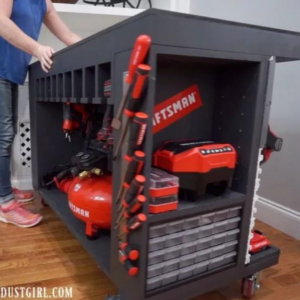Do you own a few tools for your DIY projects and household chores, or are you a general contractor with an extensive collection of construction tools? Either way, it’s important that these tools are stored properly to prevent damage. Storing tools, especially power tools, in your garage or basement is not the best option. They’ll be subject to damage from temperature changes and being knocked to the floor from their shelving or pegboards.
More importantly, if you have young children, they seem to gravitate to the most dangerous items in your home. If they discover these curious looking implements, they’ll be immediately attracted to them. Unquestionably, tools are dangerous in the wrong hands. You need a solution for these costly items, and you need it yesterday. As noted above, your solution is not your garage or basement, nor is it a shed in the backyard. It’s a safe, secure self storage unit. Here at Trusted Self Storage, we can offer you everything from a 5 x 5 unit to a warehouse-sized space.
Below are some tips for storing your tools to keep them organized and in prime condition.
The Right Way to Store Power and Hand Tools in Self Storage
Choose the Right Storage Unit
Before you do anything, give some thought to choosing the right storage facility to suit your needs. If you’re going to use your tools regularly, a convenient location is important. You also need to check that it is safe and secure and the right fit for your budget.
To best protect your tools, they should be stored in a climate-controlled storage unit. Climate-controlled storage keeps a unit’s indoor temperature between 55° and 85° F, and maintains a humidity level of 55%. As a comparison, the average air conditioned home stays between 35%-45% humidity. Think of climate control as an air-conditioner, humidifier, and dehumidifier combination to sustain the proper temperature and humidity levels for specific types of items.
Before You Organize, Prepare Your Tools for Storage
- Step 1: Check the manufacturer’s instructions – The best way to care for your tools and protect them from damage is to follow the manufacturer’s instructions.
- Step 2: Clean your tools – The first step to preparing your tools for self storage is cleaning them. Use a soft cloth and some oil to remove any stubborn dirt. Be sure not to use soap and water, as this can cause rust.
- Step 3: Use original cases – When storing your tools, store them in the cases they originally came in. These cases will have cushioning and padding to protect your tools..
- Step 4: Check for damage – Discard any tools that are damaged beyond repair. This will help to keep your tool collection organized and prevent it from taking up unnecessary space.
- Step 5: Power tools need extra prep – Humidity and dust can damage your power tool engines. Wipe down your tools and parts with oil to remove dirt and grime. If possible, pack these tools in their original boxes. Use protective casing over sharp edges and saws and fill any gaps in your boxes with bubble wrap or other appropriate cushioning material.

Organize for Convenience
- Organize small tools in like sizes and place them in plastic bins, and place them on shelves rather than on the floor. Don’t forget to label the bins.
- Another option for small tools that are used frequently is a pegboard. Home Depot has lots of good ideas for tool storage and organization.
- A pegboard also works well for long-handled tools. Tie the handles together and hang them from sturdy pegboard hooks.
- A mobile workbench is a great idea for your large tools. You can find the plans for the one pictured above at The Spruce. It includes hanging storage for power tools and ample space for storing large tools. Build in sufficient storage so that the top remains a clear work surface.
- Keep an inventory list of all of your tools. If you have a large number of tools in bins and boxes, make a simple map of the locations of the tools in your self storage unit. Hang it on a clipboard in your unit so that you can easily locate whatever you need.
In Summary
Keeping your tools in self storage not only frees up space in your garage or basement, but keeps them from curious little hands. It sounds like a lot of effort; but, in reality, isn’t it worth a few hours to keep your tools from getting lost and your children safe? Eventually, you may be able to lease a unit with electricity and set up a work area for yourself. But, that’s a conversation for another day.